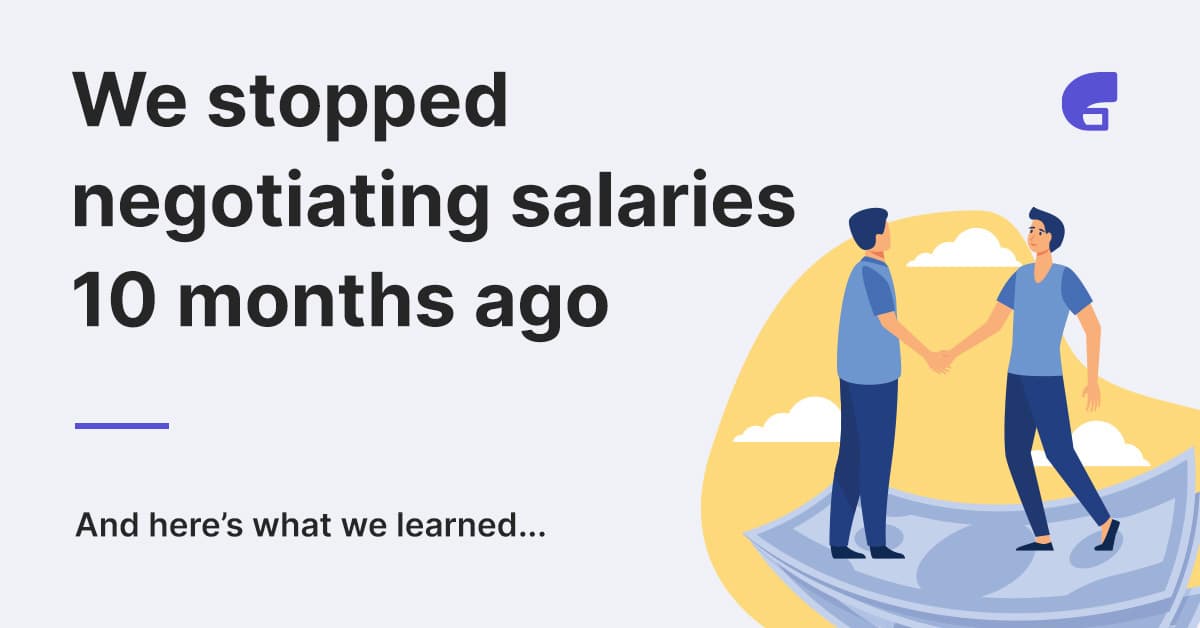We took an unconventional decision 10 months ago. Here’s what we learned…
Never take the first salary number you are offered.
You’ve got to negotiate for a higher pay before you pick up a new stint and then multiple times during your career.
– Every career expert, anywhere
Why do experts give this advice? Simple – companies will always try to get you to work for cheaper unless you ask for more.
Companies often start with a much lower offer since they expect the candidate to negotiate and candidates automatically reject what’s offered to them.
Also read: How to choose the right startup job offer?
This becomes a low-trust starting point in what should be a mutually beneficial partnership based on high trust and good faith.
Towards a new inning of trust and transparency
At Cutshort, we’ve been super transparent about our paychecks internally. Building on this culture, we decided to adopt a no-negotiation policy around 10 months ago. This was a bet on the kind of culture we want to build and was guided by our beliefs that we don’t want to have candidates worry about their pay, we wanted them to only focus on their value and impact. Constant negotiations can be damaging to the employee motivation, self-respect, and mental peace of both the talent and the leadership.
Also Read: We don’t negotiate salaries anymore (and it feels liberating!)
Now, 10 months later, it’s time to share some of the specifics of how we did this and the impact of this overall so that other companies mulling how to fix the remuneration bit can find some useful cues from our experience.
Here we go. The honest lowdown of what happened once we stopped negotiating salaries.
How we did this?
The first critical piece was to build an objective salary calculator. We created this based on the kind of teams we had and what we were paying them.
The goal was to keep it simple while still accounting for the important things that determine the “value” a team member brings. We talked about these in this blog post.
We had a few discussions about how we’ll bring our existing team to parity. We eventually brought our team to similar levels over the span of the next three months and broke the news to them. We also proactively revised the salaries of our existing employees based on their impact and the value they add.
Results after 10 months
We have made around 22 offers in the last 10 months. And here are the results.
- Firstly, our people love it. We have received appreciation internally and externally for this. Candidates have never seen a culture like this, and getting the salaries they want gets them to trust us and it has really improved their investment in the company’s mission and vision.
- At a time when the world debates Global Resignation, we’re witnessing lesser attrition as our employees are now more motivated to contribute. At the same time, most employees are punching above their weight without being prompted!
- Yes, we may have overpaid 10-20% more than the market trends but it has been totally worth it. In fact, we have offered deserving candidates 3x their current pay sometimes without them asking for it because we don’t want anyone to be distracted by the idea that they’re not being paid a fair wage.
- While this model has proven to be an objective, fair and transparent way of benchmarking compensations, we have ensured that the top performers have space to command higher salaries without feeling cramped. The idea is to build a system that can be objectively explained with transparency
Also read: 5 Tips To Ensure Career Success When You Negotiate Salary For Your Next Job
Summing it up
Being objective about our salaries has created unmatched peace within the company. Existing team members know they don’t have to ask for salary revisions – they will happen automatically. New team members join us with full conviction that they are choosing the company with the right values.
Now, we’re not saying our finance team jumped at the proposal – as said earlier, in the 10 months that this policy has been around, we’ve paid 10-20% more in general. But if this is the cost of creating a workspace where people aren’t distracted by each other’s paycheck and focus on collectively adding value – it’s a bet worth taking.
As Cutshort grows, questions of how this policy will shape up come up regularly.
Some challenges we faced
The model works very well with established teams, but new departments always face some difficulty in seeing what the starting point should be.
Our notes to other companies
With startups facing high rates of employee turnover, and candidates having a renewed understanding of fair payment – it’s time to look at creating environments where no one has to negotiate what they should be paid.
In the larger scheme of things, it’s important for companies to create their own data-driven models. It’s more important to create a space to attract top performers and encourage their growth.
Startups, especially, could consider a no-negotiation workspace. If yours is a startup focusing on attracting the right skill and cultural fit, this should be a no-brainer. If you want to maximize the impact of the work your teams do, try to eliminate unnecessary politics, and make your teams the owners of what they do.
Coming up with a no-negotiation policy isn’t going to be easy. And it certainly isn’t something your organization should adopt if it doesn’t fit in your overall culture. That said, we’ve benefited from this move immensely and it’s perhaps time to start rethinking salaries and take the proverbial ‘money stuff’ off the table to make space for creating value.
Have you adopted or noticed any innovative compensation practices? We would love to hear more ideas and perspectives.


